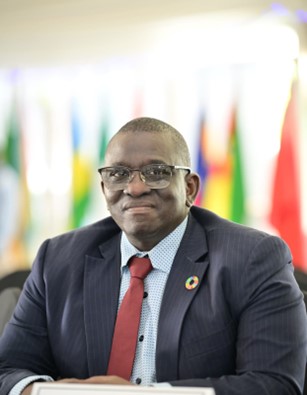 Foreword
Foreword
The world is currently experiencing two significant trajectories: the urgent need to transition towards steady-state growth powered by clean and renewable energy, and the embrace of the fourth industrial revolution with its groundbreaking emerging technologies.
These parallel changes require an environmentally conscious and technologically empowered paradigm shift, with Africa playing a crucial role in this global transition.
Currently, Africa boasts the youngest population in the world, with 70% of its youth under the age of 30. According to United Nations projections, by 2050, Africa will comprise 26% of the global population. This distinctive demographic makeup, combined with Africa's promise of a demographic dividend, a vibrant entrepreneurial readiness, and an increasing embrace of connectivity, highlights its potential to lead a digital transformation that is in tandem with Africa’s rich ecological services. These opportunities collectively underscore Africa's ability to recalibrate its environmental stewardship by leveraging locally sourced innovations, STEM skills and emerging technologies.
Despite these promising opportunities and advancements, Africa faces three intrinsic challenges that hinder this paradigm shift: the digital infrastructure gap, inadequate policies for governing emerging technologies, and the digital skills and tech-equity divide. Africa has the highest number of people without any form of identity document, totaling 470 million. This lack of identification prevents them from accessing essential services such as healthcare, social protection, education, and financial services. On the contrary, an investment of one dollar in Digital Public Infrastructures (DPIs) can yield a return of 32 dollars gained from enhanced institutional competitiveness and citizen welfare.
However, building robust and interoperable DPIs requires harmonized digital policies and regulatory frameworks. These frameworks are essential for governments to deliver effective e-government services to their communities while aligning with international protocols. Cyber diplomacy also plays a crucial role in aligning digital policies and best practices, as it is essential for each Member State to harmonize regional and global security protocols, while ensuring national data sovereignty. Optimizing taxation in the ICT sector can also boost job creation and government revenue are also key, while ensuring that digital taxation frameworks enhance service value without stifling innovation.
New advancements in open-source platforms, STEM skills development, artificial intelligence, coding, robotics, and Web 3.0 applications present exciting opportunities to leverage Africa's demographic dividend by upskilling its young digital talent. These technologies offer new avenues for harnessing Africa’s demographic potential through the knowledge economy, moving beyond mere reliance on extractive industries and ecological services.
The growing demand from our Member States for fiscal policy studies, especially in digital tax systems, highlights the urgent need for ECA’s expertise. Governments are increasingly seeking our support to enhance digital tax collection and optimize tax administration in key sectors like telecommunications and instant payment systems.
It is within this intricate backdrop that this year’s Conference of Ministers oversaw the declaration on the establishment of ECA’s Technology Division by 2025, comprising three sections: Digital Transformation, STI, and Innovation. ECA’s new Technology, Innovation, Connectivity and Infrastructure Division (TICID) aims to facilitate the formulation, adoption, and implementation of new technology and innovation policies for African member states as means of improving the competitiveness of institutions, welfare of citizens, and collective and individual security founded on universal human rights.
By facilitating continental consultations on issues such as data governance and cybersecurity, ECA works to inform national strategies and drive impactful contributions from public-private partnerships. Joint initiatives such as the African Digital Public Infrastructures (DPI) initiative aims to create secure, interoperable digital systems to transform public service delivery. ECA is collaborating with key organizations, including the Office of the Secretary-General’s Envoy on Technology (OSET), International Telecommunication Union (ITU), Office of the Special Adviser on Africa (OSAA), and the African Union, on the joint effort to establish the African Digital Public Infrastructure - Stack Blueprint – which enables African countries to establish DPIs tailored to local needs and influence the evolution of globally relevant open-source systems.
ECA recognizes the need for coherent digital policies and regulatory guidelines that encourage innovation, enable regional interconnectivity, and respect national data sovereignty. By consolidating the voices of African Member States and key stakeholders, ECA ensures the region’s priorities are effectively reflected in global processes and frameworks such as the African Union’s Digital Transformation Strategy 2023, WSIS+20 Reviews, regional Internet Governance Forums (IGFs), and the Global Digital Compact (GDC) set to be adopted in September at the Summit of the Future.
The Division encompasses two pivotal facets: firstly, to augment the capacities of Member States in crafting and executing initiatives that harness the potential of new technologies towards sustainable development. Secondly, to fortify the adoption of the Good Digital ID framework Principles as catalysts for both digital transformation and the attainment of inclusive public services (e-gov systems). Accordingly, among the key program of work for ECA’s Digital Center of Excellence is to accelerate regional interoperability through digital ID, Civil Registration and Vital Statistics (CRVS) systems and interoperable digital public goods (DPGs) that mutually enhance regional cooperation among Member States and technical collaboration among public service institutions, private players and academia.
In today’s dynamic and transformative digital landscape, ECA stands poised to be a catalyst for change, fostering collaborative endeavors, innovative solutions, and visionary strategies that will power Africa's role in shaping the global digital future. As we embark on this journey, we do so cognizant of the challenges ahead, yet driven by the belief that technology can supercharge Africa’s sustainable and flourishing future.
Mactar Seck (Dr.),
Chief-of-Section,
Technology and Innovation, Economic Commission for Africa (ECA)
Coordinator, Digital Center of Excellence on Digital ID, Trade, and Economy (DITE4frica)
